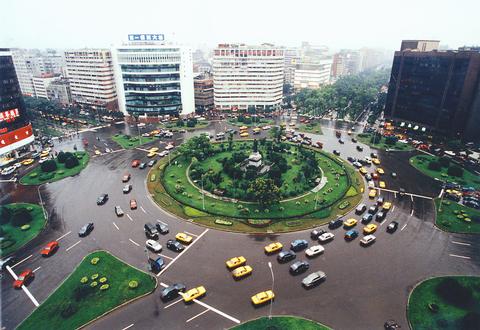Conditions in the the Taipei office market are expected to deteriorate, with the vacancy rate predicted to increase by more than 10 percent in coming months as the market struggles to absorb an oversupply, according to industry reports.
According to a report by Colliers International, commercial real-estate development in 1999 and 2000 when conditions where more favorable, led to the present glut in supply.

PHOTO: TAIPEI TIMES FILE PHOTO
Colliers says the market is not able to absorb the new supply -- of which 41 percent is in the Hsinyi District. The vacancy rate in Taipei was 8.91 percent in the first quarter, and it is expected to increase by 10 percent during the remainder of the year.
According to Derek Huang (
"Demand will not be as high as they expect in that area," Huang said.
"Although the Taiwanese economy seems to be moving from the slowdown to a rebound, is not recovering as fast as earlier anticipated. Enterprises are still holding a conservative attitude and have postponed their office expansion plans," the report said.
Huang said demand will remain weak despite the stronger performance of the local stock market -- which has risen in value since Jan. 1 by 8.3 percent off lows last year -- adding that companies are taking advantage of increased supply to negotiate lower rental prices.
Lower rental prices resulted in a contraction of room for negotiation on rentals -- the difference between asking price and actual price -- from 8.36 percent to 7.75 percent, according to the Colliers report.
The city's office vacancy rate increased only slightly. Overall average rental prices for Taipei's office market fell by 2.2 percent over the previous quarter, with average effective rental prices falling to NT$2,062 per ping, according to Colliers.
Buying activity is also likely to pick up during the next two years as banks begin to more actively dispose of their non-performing loans -- which are largely collateralized with real estate -- pulling retail prices down further, said Huang.
"First Commercial Bank disposed of a bunch of NPLs. We expect AMCs in the near future to dump these properties into the market which will drop the market value even further," Huang said.
However, any large-scale buy up of real estate -- regardless of the low prices -- by local or foreign conglomerates is likely some way off as rental yields still remain paltry compared to markets elsewhere in the region.
According to the Colliers report, average yield for this year will remain at 6.04 percent -- the same as last year -- and will rise slightly to 6.14 percent next year.
By comparison, rental yields in cities such as as Beijing and Shanghai range between 14 percent and 17 percent.

Taiwan Semiconductor Manufacturing Co (TSMC, 台積電) secured a record 70.2 percent share of the global foundry business in the second quarter, up from 67.6 percent the previous quarter, and continued widening its lead over second-placed Samsung Electronics Co, TrendForce Corp (集邦科技) said on Monday. TSMC posted US$30.24 billion in sales in the April-to-June period, up 18.5 percent from the previous quarter, driven by major smartphone customers entering their ramp-up cycle and robust demand for artificial intelligence chips, laptops and PCs, which boosted wafer shipments and average selling prices, TrendForce said in a report. Samsung’s sales also grew in the second quarter, up

On Tuesday, US President Donald Trump weighed in on a pressing national issue: The rebranding of a restaurant chain. Last week, Cracker Barrel, a Tennessee company whose nationwide locations lean heavily on a cozy, old-timey aesthetic — “rocking chairs on the porch, a warm fire in the hearth, peg games on the table” — announced it was updating its logo. Uncle Herschel, the man who once appeared next to the letters with a barrel, was gone. It sparked ire on the right, with Donald Trump Jr leading a charge against the rebranding: “WTF is wrong with Cracker Barrel?!” Later, Trump Sr weighed

HEADWINDS: Upfront investment is unavoidable in the merger, but cost savings would materialize over time, TS Financial Holding Co president Welch Lin said TS Financial Holding Co (台新新光金控) said it would take about two years before the benefits of its merger with Shin Kong Financial Holding Co (新光金控) become evident, as the group prioritizes the consolidation of its major subsidiaries. “The group’s priority is to complete the consolidation of different subsidiaries,” Welch Lin (林維俊), president of the nation’s fourth-largest financial conglomerate by assets, told reporters during its first earnings briefing since the merger took effect on July 24. The asset management units are scheduled to merge in November, followed by life insurance in January next year and securities operations in April, Lin said. Banking integration,

LOOPHOLES: The move is to end a break that was aiding foreign producers without any similar benefit for US manufacturers, the US Department of Commerce said US President Donald Trump’s administration would make it harder for Samsung Electronics Co and SK Hynix Inc to ship critical equipment to their chipmaking operations in China, dealing a potential blow to the companies’ production in the world’s largest semiconductor market. The US Department of Commerce in a notice published on Friday said that it was revoking waivers for Samsung and SK Hynix to use US technologies in their Chinese operations. The companies had been operating in China under regulations that allow them to import chipmaking equipment without applying for a new license each time. The move would revise what is known